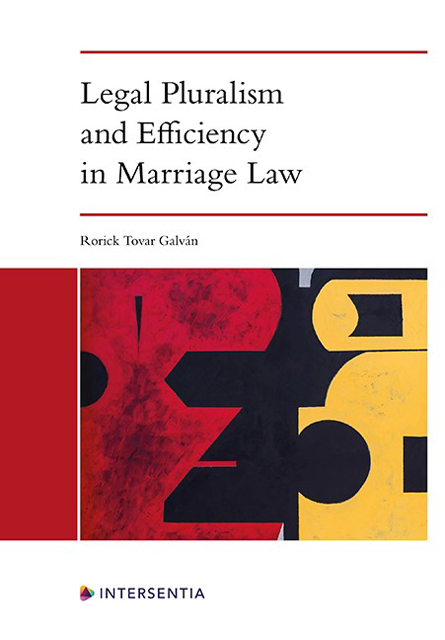Book contents
- Frontmatter
- Dedication
- Miscellaneous Frontmatter
- Foreword
- Preface
- Acknowledgments
- Contents
- List of Cases
- Introduction: Uncertainty and Inconsistency Surrounding the Determination of the Applicable Law in the EU Instruments on Matrimonial Issues
- Part I Economics As A Point Of Departure To Explain The Substantive Rules On Matrimonial Issues
- PART II Economics as a Point of Departure to Build a System of Conflict of Laws For Matrimonial Issues
- Conclusion: Certainty, Precision, Coherence, and Simplicity in the Determination of the Applicable Law
- Bibliography
- Index
- About the Author
Chapter 1 - Marriage as a Contract and its Economic Function for the Spouses
Published online by Cambridge University Press: 17 December 2022
- Frontmatter
- Dedication
- Miscellaneous Frontmatter
- Foreword
- Preface
- Acknowledgments
- Contents
- List of Cases
- Introduction: Uncertainty and Inconsistency Surrounding the Determination of the Applicable Law in the EU Instruments on Matrimonial Issues
- Part I Economics As A Point Of Departure To Explain The Substantive Rules On Matrimonial Issues
- PART II Economics as a Point of Departure to Build a System of Conflict of Laws For Matrimonial Issues
- Conclusion: Certainty, Precision, Coherence, and Simplicity in the Determination of the Applicable Law
- Bibliography
- Index
- About the Author
Summary
When people are asked why they got married, the most common answer is love. I have no doubt that this feeling is the motor that drives most people to take the great leap. However, this sentiment alone does not seem to be a sufficient reason for people to get married. There are many couples that despite being in love are not legally bound to their partners. Indeed, most individuals experience such a feeling with great insensitivity at the beginning of a relationship, but they usually wait for a time – months or even years later – before deciding to marry. Love is crucial to stop the search for a potential partner to found a family with, but there must be something more explaining the decision to get involved in a legal relationship with another person. Being more pragmatic, one can assume that – aside from love – the reason lies with the age of the people, or even the pressure from the rest of the society. It is no coincidence that people living in a certain territory decide to get married at a similar age. Marriage is a very contagious phenomenon. Once one receives the first wedding invitation of a peer, they continue to crop up and sooner or later attending wedding receptions as a bachelor starts being the exception. Reaching a certain age prompts individuals to formalize their relationship; even more so when other individuals of the same age do the same. However, this factor cannot sufficiently explain the reasons to get legally involved with another person. One cannot deny that the so-called biological clock urges people to have children and start a family. However, maturity does not seem to impel them to rush to the civil registry office or city hall to get married, but simply to seek a greater stability in their relationship and to settle down. After all, having children and cohabiting with another person are possible without any formal agreement in practically all modern societies.
Love, customs, age and many other factors undoubtedly play a major role when thinking about marriage. Still, none of them can explain by itself why people not only carry out ceremonies in the presence of family and friends, but are also willing to formalize their desire to stay united before an authority – in most cases a state-run one – and to commit themselves to fulfill a number of duties, thereby sacrificing other interests and future life choices.
- Type
- Chapter
- Information
- Legal Pluralism and Efficiency in Marriage Law , pp. 43 - 62Publisher: IntersentiaPrint publication year: 2022



